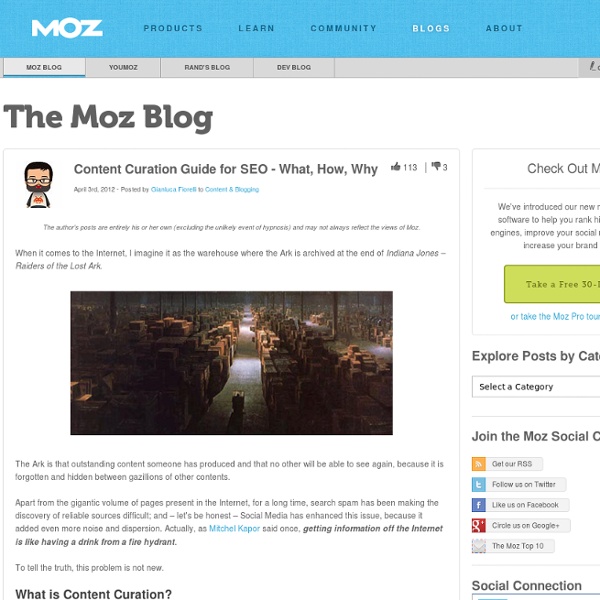Creating a Content Curation System and Increasing Social Media Productivity
One of the most common questions we hear from prospects and clients is: How can you be effective with social media marketing while preventing it from being a major time sink? To be honest, this is a daily challenge even for us. The fact of the matter is social media marketing is very labor intensive and difficult to scale.
Content Curation: The Ultimate Guide
33inShare Content curation is a hot topic of discussion in marketing circles these days. One of the biggest problems businesses face when they try to pursue content marketing is finding the time to actually produce the content. But when you curate content, you don’t really have to produce anything. Sort of…
Keyword-Level Demographics
The author's posts are entirely his or her own (excluding the unlikely event of hypnosis) and may not always reflect the views of Moz. Keyword-Level Demographics On Tuesday I made my speaking debut at SMX East 2011 on a panel with Lena Flanigan (Life Technologies) and the creator of Google Webmaster Tools Vanessa Fox (Nine by Blue). The session was called “Using Searcher Personas to Connect Search to Conversions” and I unveiled a methodology that I think is potentially game changing.
7 Tips To Help You Focus In Age of Distraction: Are You Content Fried!
Mindmap by Jane Genovese This morning I learned a new word for information overload – “content fried” from a colleague at the Packard Foundation. It resonated.
Using Curation to Create the Perfect Content Marketing Mix [INFOGRAPHIC]
“There’s much more to content curation for marketers than simply aggregating and amassing content. Marketers can add value by analyzing and re-purposing each piece of information,” says Neil Bhapkar, Director of Marketing at Uberflip. “Content curation can enable marketers to re-channel relevant content to spark engagement and awareness with customers and prospects.”
Preparing a Team to Win at Content Marketing
About a month back we talked about putting together an SEO team over at Authority Labs. We picked up some positive feedback, and we thought we’d expand this approach into the arena of content marketing specifically. Now, without a doubt, there’s some serious overlap between the two disciplines. So, to keep this from being a carbon copy of the last post, we’re going to assume more resources for this post.
Digital Publishing: Curation vs Collection vs Experience
Content curation can be a powerful way to serve those in your market, and establish a unique brand position that differentiates you from your competitors. Today, I want to explore that challenges of curation, and compare how it differs from merely ‘collecting.’ (Note: by curation, I mean to care for, and carefully select which content is shared, with the idea that removing something can sometimes make a collection even stronger.) Curation has been a big buzz word in online publishing for a long time now.
How I use Followerwonk, and Why I Love It
Best of 2013: No 11 – How I use Followerwonk, and Why I Love It During the holiday weeks we will be showing you the 15 best read posts of 2013. Except for on Christmas and New Years day, each day you can read the best articles again, going from number 15 back to number 1. Now it’s time for number 11, originally posted on March 7 2013, a post by Gianluca Fiorelli. Never like today SEOs and Internet Marketers had so many tools about practically every aspect of their job.
6 Facts About Content Curation and SEO You May Not Know
If you struggle with providing a steady stream of fresh, relevant content for your website, you’re not alone. Perhaps one of the best ways to overcome this challenge, while also increasing the value you provide to your audience, is through the process of editorialized content curation. But while we know that this process (when done right) is beneficial in terms of driving traffic, extending reach and providing interesting and valuable content, what does Google think about content curation? Following are 6 facts about content curation and SEO you may not know – but that you really should if you’re going to use content curation as part of your own content strategy.
Internet Marketing Strategy based on Audience Analysis
Let me tell you a story… Imagine a place: Middle East You see ocher landscapes in the distance, few palm trees around an oasis and a hill with a castle on top of it. Idyllic, isn’t it? No, it is not idyllic. Why?



